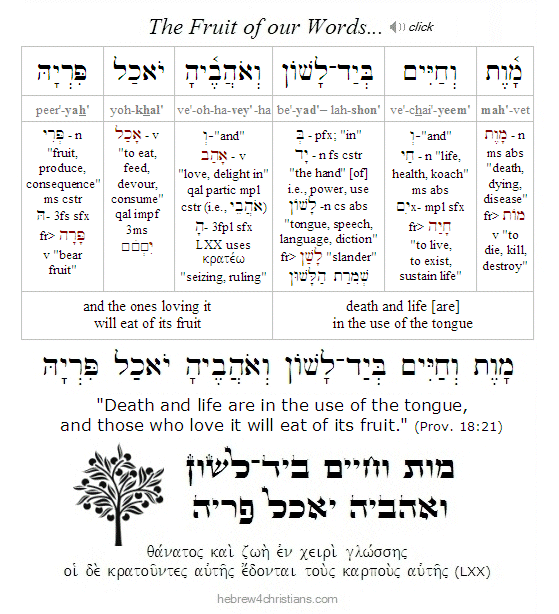|
According to the sages, tzara'at ("spiritual dis-ease") was a punishment for evil gossip, or "lashon hara" (לָשׁוֹן הָרָה). In midrashic literature, lashon hara is regarded as equal to idol worship, sexual immorality, and murder, and the one who indulges in it defiles his mouth so that even words of Torah and prayer are corrupted. "From the same mouth come blessing and cursing; brothers, these things ought not to be so" (James 3:10). The sages even go further: "Lashon Hara is worse than murder. One who murders, murders but one; however, one who speaks lashon hara kills three: the one who speaks it, the one who hears it, and the one of whom it is spoken." Lashon hara is likened to "emotional homicide" caused by publicly shaming another. According to the Talmud, the shamed person's face is drained of blood and turns white, and therefore humiliation is called halbanat panim, "whitening the face." Therefore the sages identify the metzora (i.e., leper) with hamotzi ra, "one who brings forth evil," and they stress shemirat ha-lashon (שְׁמִירַת הַלָּשׁוֹן), the "guarding of the tongue," as a central virtue of the righteous.
The story is told of a peddler who used to travel throughout the land crying out, "Who wants to buy the elixir of life?" Huge crowds would draw around him. Rabbi Yannai was sitting and explaining Torah in his room and heard the peddler's calls. So he went to him and asked to purchase some of this elixir. The peddler responded, "Neither you nor people like you require what I have to sell." The rabbi pressed him so that the peddler went to him and took out a book of Psalms reading the verse: "Who is the man that desires life and wants to see good? Keep your tongue from evil!" Rabbi Yannai responded with amazement, "All my life I have read this verse and didn't understand how this was to be explained, until this peddler came and made it clear to me" (Midrash Rabbah). Before he met the peddler, the rabbi thought the verse referred solely to the reward in the world to come, but it never occurred to him that it referred to this life as well. Guarding the tongue promoted health and avoided those stresses that hasten death.
Yeshua our Lord went well beyond these requirements and told us that whatever is spoken in this life is "echoed" throughout eternity and will be reheard upon the day of judgment: "I tell you, on the day of judgment people will give account for every careless (ἀργὸν) word they utter, for by your words you will be justified, and by your words you will be condemned" (Matt. 12:36-37). We are especially warned against making promises we might break: "Let what you say be simply 'Yes' or 'No'; anything more than this comes from evil" (Matt. 5:37). Therefore the Holy Spirit says through David: "What man is there who desires life and loves many days, that he may see good? Keep your tongue from evil and your lips from speaking deceit."
מִי־הָאִישׁ הֶחָפֵץ חַיִּים
אהֵב יָמִים לִרְאוֹת טוֹב
נְצר לְשׁוֹנְךָ מֵרָע וּשְׂפָתֶיךָ מִדַּבֵּר מִרְמָה
mee · ha·eesh · he·cha·fetz · chai'·yeem
o·hev · ya·meem · leer·oht · tov
ne·tzor · le·shon·kha · mei·ra · oos·fa·te'·kha · mee·da·beir · meer·mah

"What man is there who desires life
and loves many days, that he may see good?
Keep your tongue from evil and your lips from speaking deceit"
(Psalm 34:12-13)

Hebrew Study Card
The tongue also refers to our "self talk," or the inner monologue within us that reveals our heart's condition: "For out of the abundance of the heart the mouth speaks" (Matt. 12:34). If we are admonished to guard our lips, then for all the more reason we must guard our hearts (Prov. 4:23-24). If troubles presently beset you, learn to regard them as the "troubles of love" (i.e., yissurei ahavah: יִסּוּרֵי אַהֲבָה), that is, challenges that God is using for your good. After all, your life itself is evidence of God's chesed, his gracious love, for you, and you believe that God works all things together for good to those who love Him (Rom. 8:28). Conversely, "Whoever guards his mouth and his tongue, guards his soul from troubles" (Prov. 21:23). "Death and life are in the hand of the tongue" (Prov. 18:21), and therefore refraining from evil talk not only prevents death but also adds to life.
When we speaking with deceit (or with guile), we speak with a "forked-tongue," saying one thing with the lips but intending something else within the heart. The inner and the outer are to be unified in our lives, and we are to be free of duplicity. Do not be a hypocrite who pretends to be something you are not (Prov. 3:9).
Guarding your tongue is evidence that you are truly fearing the LORD, since the passage is preceded with the statement: "Come, children, listen to me: I will teach you the fear of the LORD" (Psalm 34:11). Fearing the LORD means being filled with the wonder of the Divine Presence. The one who fears the LORD will "see good," that is, he will see the goodness of his surroundings in the light of God's Presence. Seeing the good in others, using ayin tovah (a good eye), is therefore the contrary of lashon hara, or slander. Our words should be used to upbuild, edify, and esteem others, not to tear them down. Lashon hara is evidence, then, of a critical spirit, an evil eye, and a suspicious heart. We must look to God for the miracle of seeing the truth of His goodness in all things.
Those who think it easy to control the tongue have likely never really tried to do so. "The tongue is a small member, yet it boasts of great things. How great a forest is set ablaze by such a small fire! And the tongue is a fire, a world of unrighteousness. The tongue is set among our members, staining the whole body, setting on fire the entire course of life, and set on fire by hell" (James 3:5-6). Ultimately, controlling your tongue is a matter of controlling your inner thoughts, your heart, and your attitude (shemirat ha-lev). Therefore we are admonished to be "quick to hear, slow to speak, slow to anger," since the anger of man never works the righteousness of God (James 1:19). May the LORD our God help us always to speak with grace, "seasoned with salt" (Col. 4:6); and may we all "speak the truth in love to grow up in every way" (Eph. 4:15).
Hebrew Lesson
Prov. 18:21 reading (with commentary):
|




